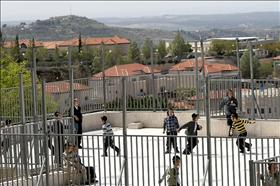"Pick up your pencils, it's time to begin."
High Court of Justice ruling brings standardized testing to ultra-Orthodox schools
Israeli Supreme Court decision will bring greater Ultra-Orthodox involvement in society and as a result, more economic growth.
21/02/2013 12:47
Tags: Ultra-Orthodox Education · Core Curriculum · Supreme Court · Stanley Fischer · Dan Ben David

Haredi school children in Beitar Illit playing on the roof of the school. 22.03.2010. Photo: Nati Shohat, Flash 90
On February 20, 2013, the Israeli High Court of Justice ruled that the Ministry of Education must administer the "Meitzav" standardized achievement test to students in ultra-Orthodox schools. The test is taken by Israeli students in all state- funded schools but until now has only been marginally implemented in ultra-Orthodox schools. Rabbi Uri Regev, president of Hiddush – Freedom of Religion for Israel, welcomed the important decision of the Israeli Supreme Court, stressing that, "This is a necessary step forward in the hugely important process to bring the core curriculum to ultra-Orthodox education in Israel."
The decision came as a response to a petition filed by the Israel Religious Action Center in 2010 to enforce supervision in ultra-Orthodox schools that teach a partial curriculum of secular subjects. According to Rabbi Regev, "when their students are given the [state-administered] tests it will become crystal clear to what extent the ultra-Orthodox educational institutions have been bluffing with their refusal to implement the core curriculum in Ashkenazi boys' yeshivas. We will see how obvious it is that the small amount of material outside of Torah study that they have covered does not fit an acceptable standard by any means."
In many ultra-Orthodox schools, students' studies focus almost entirely on Torah and Talmud and their schools marginally teach mathematics, science, literature, and foreign languages; subjects that constitute the core curriculum in Israel. The push for reforms in the ultra-Orthodox educational institutions comes in light of significant calls for change from many leading economists in Israel, such as Bank of Israel Governor, Stanley Fischer, and Professor Dan Ben David, Executive Director of the Taub Center for Social Policy in Israel. Fischer identified the non-participation of the ultra-Orthodox sector in the workforce as the main problem to Israel's economic growth and called for early implementation of the core-curriculum to alleviate the widespread poverty and dependence on state welfare in the ultra-Orthodox community. In December of 2012, Ben David released a report, entitled, "The Start-up Nation's Threat from Within," in which he demonstrated the need for the inclusion of the core curriculum in the ultra-Orthodox education to similarly prevent further stunting of Israel's economic growth.
"The ultra-Orthodox leadership must be presented with a clear choice: If they are determined to continue to provide partial education to their students, it's going to come from their own pockets and not from the piggy bank of the rest of Israeli tax-payers."
In addition to the support of economists, there has also been a rising amount of public pressure for ultra-Orthodox involvement in the Israeli workforce, a cumbersome process whose roots are found in education. "The voting public has called for the inclusion of the core curriculum in ultra-Orthodox schools. Tzipi Livni promised in her party's platform to push the core curriculum, as well as Yesh Atid and the Jewish Home. They must understand that nothing is as compelling for the future of Israel's economy as these educational reforms, " Rabbi Regev remarked. "They need to stand by their commitment and demand that an institution that does not teach the full core curriculum will not be funded by the state, the ultra-Orthodox educational system must teach a real curriculum and not the fictitious one that has been in place up until now, and the law that provides funding for Yeshiva High schools without the core curriculum at all must be annulled."
Following the court's decision, the Ministry of Education has been charged with the task of developing a plan within 100 days to implement the standardized tests. Rabbi Regev concluded that, "the ultra-Orthodox leadership must be presented with a clear choice: If they are determined to continue to provide partial education to their students, it's going to come from their own pockets and not from the piggy bank of the rest of Israeli tax-payers."